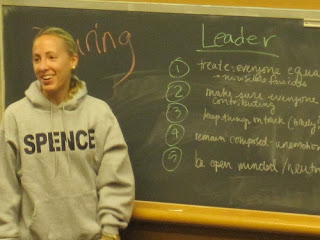- Public Policy
- Leadership
- Funding
- News & Events
- About the Center
Back to Top Nav
Back to Top Nav
Back to Top Nav
Back to Top Nav
During the midterm exam weeks, participants of the Management and Leadership Development Program (MLDP) have the opportunity to attend one or both of the one-hour special topics offered. During the October 19th session, both special topics offered were extremely valuable skills that student leaders of campus organizations. Theses skills are also transferable to life after Dartmouth.
“Facilitation: Putting an End to Boring Meetings”
City Councilor of Lebanon, New Hampshire, Karen Liot Hill, led part one of the MLDP session on meeting facilitation. A member of the Dartmouth Class of 2000, Councilor Hill also served as Mayor in 2008-09.
Drawing on her experience in the political realm, Councilor Hill spoke with MLDP students about the importance of excellent facilitation when conducting meetings. She spoke of how to make meetings more productive and effective, focusing on the importance of The Facilitation Framework Triangle. This diagram highlights the three main points of facilitation: purpose, process, and people. Councilor Hill also conducted an activity in which students explored how to be both a great facilitator and an active participant before, during, and after a meeting.

“Event Planning: Steps to a Successful Presentation”
Keely Ayres conducted the second part of this MLDP session, with a focus on event planning. The Senior Production Manager for the Hopkins Center, she has production managed for a wide range of events, including the 2007 MSNBC Democratic Debate and President Kim’s Inaugural “Dartmouth and the Performing Arts” performance with Rachel Dratch and Buck Henry.
During this session, Ms. Ayres shared her wealth of experience in production management, giving valuable tips and techniques on how to successfully plan for an event. She highlighted the importance of organization and introduced the Gantt chart, a valuable scheduling tool that can be used for any event. The session concluded with students in small groups using a Gantt chart to organize their own events.
-- Kali Montecalvo '13